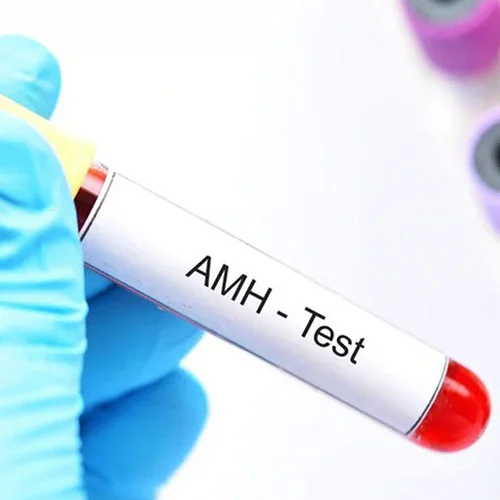All Departments
- PCOS Treatment
- STD Treatment
- Infertility Treatment
- Fibroid Treatment
- Endometriosis Treatment
- Ovarian Cyst Treatment
- Sexual Dysfunction
- Menopause Specialist
- Irregular Menstrual
- Laparoscopic Gynecologists
- Hysterectomy
- Urogynecologist
- Contraception
- Colposcopy
- AMH Testing
- O Shot
- G shot Treatment
- Vaginoplasty
- labiaplasty
- Clitoral Hoodectomy
- Vaginal Bleaching
- High-Risk Pregnancy
- Pregnancy Care
- Maternal Fetal Medicine
- Cesarean Delivery
- Painless Normal Delivery

AMH Testing
Overview
Women are born with many eggs, gradually losing quality and quantity as they age. Cells in developing egg sacs (follicles) release anti-Mullerian hormone (AMH). The level of AMH in a woman’s blood is a reliable predictor of her ovarian reserve.
The AMH fertility tests are just one of the many diagnostic innovations that have assisted gynecological and reproductive therapies in recent years. The AMH test measures the amount of anti-Mullerian hormone in a woman’s blood, which indicates her egg reserve.
Know what is AMH testing
If you are a woman who is having difficulty conceiving or is experiencing fertility issues, your doctor will almost certainly recommend an AMH test. An AMH test gives your doctor a starting point for calculating your chances of having a child.
The AMH Test informs doctors about the success of reproductive therapies like IVF in women. A high AMH level means you have more eggs than your age requires and are more likely to respond positively to hormonal stimulation. Low AMH levels imply that you are producing fewer eggs than required.
If you have PCOS (Polycystic Ovarian Syndrome), an AMH test may be recommended as well.
- Menstrual issues
Acne - Body and face hair that is excessive
gaining weight - Breast size reduction
- If you are being treated for ovarian cancer, an AMH test may be required to determine whether your treatment is effective.

When do you need an AMH fertility test ?
The AMH test is useful if:
- If you’ve been trying to conceive for more than six months and want to ensure your ovarian reserve is age-appropriate.
- If you are considering IVF or other fertility procedures.
- If you’ve had chemotherapy or ovarian surgery and want to discover if it damaged your fertility in the future.
- You suspect an ovarian tumor, wish to conceive in the future, and just want to know what’s going on.
Procedure for the AMH Test
The AMH fertility tests are done using a blood test.
Our team of the AMH specialists will draw a blood sample from a vein in your arm with a fine needle during the test. After the needle is placed, a small amount of blood is collected in a vial. This procedure takes about five minutes. The collected blood samples are forwarded for further testing.
How is the AMH test good for IVF treatment?
The Anti-Müllerian Hormone (AMH) test is useful for IVF treatment as it measures ovarian reserve, indicating the quantity and quality of a woman’s eggs. This information helps fertility specialists customize IVF plans, predict ovarian response to stimulation, and set realistic expectations for egg retrieval. While age remains a key factor, the AMH test provides valuable insights for a more personalized and effective approach to IVF.
